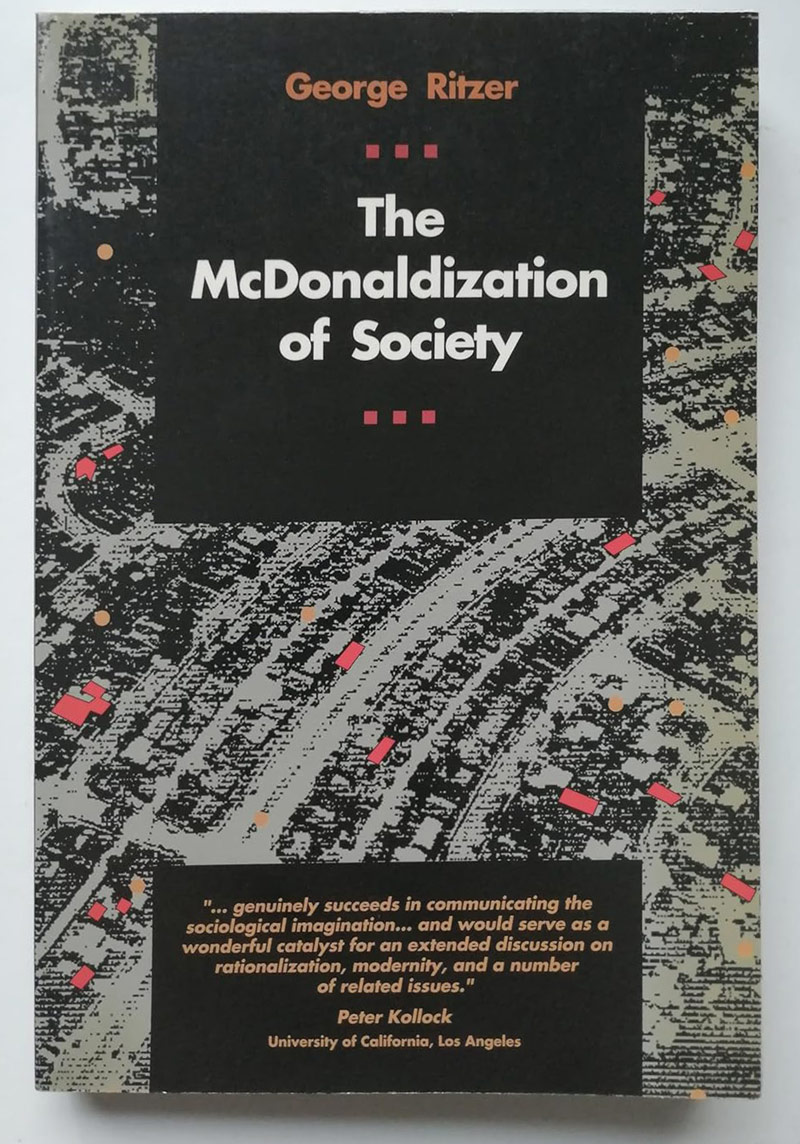
Book Reviews
The McDonaldization of Society
by George Ritzer
Pine Forge Press, Revised Edition, 1996.
Review by Sam Beale
Squall 12, Spring 1996, pg. 59.
McDonaldization is, according to Ritzer, the process by which all aspects of society, not just fast food chains, have become standardised and rationalised. Ritzer sees this process as having affected our lives from birth, education, health care and travel to leisure, politics, family, even funerals.
This book is not an anti-McDonald’s rant. Ritzer is not making overtly political statements. He is a social scientist. Thus he presents the efficiency, reliability, and wide availability of McDonald’s as positive whilst accepting the negative consequences spawned in terms of environmental damage and dehumanisation for workers and consumers. He is most interested in the trends for the rest of society which McDonald’s represent. Nonetheless he urges battling against the process, and is hugely concerned about its effects on the creativity and development of the human race and as such he is opposed to it.
His thinking is based on the work about the processes of rationalisation and bureaucratisation by the turn-of-the-century sociologist, Max Weber. Weber’s ‘worst fears’ about these processes were, says Ritzer, realised in the Nazi Holocaust which had all the necessary attributes of a rationalised system. Quite simply the end product of this system was mass extermination.
Elderly people have formed breakfast clubs which spend hours in McDonald’s.... completely subverting McDonald’s ‘eat and then piss off’ policy.
In analysing McDonaldized systems Ritzer looks at what they have in common: efficiency, dehumanisation, calculability (eg the ‘Big’ food syndrome: big food is good food even when it’s crap food), which also applies to education where the products are students whose grades are more important than the quality of their learning, TV where ratings not quality determine success; and politics where soundbites have reduced the quality of political speeches. Other aspects of McDonaldization include predictability: a Big Mac is the same wherever on earth you eat one, which extends to package tours, assembly lines and ‘little boxes’ housing policies.
“Sneakerisation” is the name Ritzer gives to the diversity of product lines to the point where we can now buy a different pair of trainers for every conceivable activity carried out on our feet. Did you know there are 100 types of walkman, 3,000 kinds of Seiko watch and 800 models of Phillips colour televisions? He sees this as the future of McDonaldization.
The arguments are extended to cover birth and the practices of sex-selection using amniocentesis and genetic defect testing taken to its ‘designer baby’ conclusion. Then of course there is pre-death healthcare: the emphasis on the weeks, days, hours and minutes a very sick person can be kept alive, rather than a focus on the quality of that person’s life during that ‘extra time’; and the loss of control we have even over death as ‘conveyor-belt’ funerals become virtually unavoidable. He notes that similar to fast-food signs asking customers to leave after twenty minutes, the City of London Crematorium sports a sign compassionately requesting the grieving to: “Please restrict service to 15 minutes”.
He shares Weber’s concern about the ultimate irrationality of rationality and this is where the book is at its most radical. He gives examples of objections to McDonaldization, and non-rationalised alternatives and how people manage to personalise and take control of their lives even when they are largely rationalised.
His guide to surviving the “iron cage” of McDonaldization includes the suggestion that for starters American readers could leave the US. There is even a very American list of things individuals can do to avoid/take action against the McDonaldization of their lives. The list includes never going to see “movies that have Roman numerals after their names” and suggestions that people who eat at McDonald’s should try and get to know the counter-staff, thus shafting the dehumanised nature of a job in McDonald’s. He notes that in the US elderly people have formed breakfast clubs who meet and spend hours in McDonald’s, undoubtedly annoying the management and completely subverting McDonald’s ‘eat and then piss off’ policy.
Ultimately he accepts the inevitability of McDonaldization but sees the process of resisting as essentially non-rationalised and individual and thus positive.
Overall a top ‘big-picture’ read with serious academic credentials.
Related Articles
Though not directly related to the McLibel trial, this book looks at the broader context of the stage of capitalism which has spawned McDonalds and similar corporate empires. For the full list of Squall articles about the McLibel Trial click here
Links
